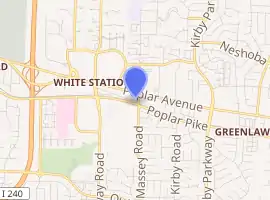Ellis Auditorium
The Ellis Auditorium was a 10,000-seat multi-purpose arena in Memphis, Tennessee, USA. It hosted local sporting events and concerts.
| Ellis Auditorium | |
|---|---|

| |
| Former names | Memphis Auditorium and Market House |
| General information | |
| Address | Memphis, Tennessee |
| Coordinates | 35°05′58.5″N 89°51′09.3″W |
| Opened | 1930 |
| Demolished | 1997 |
History
The auditorium opened in 1930. The first performance was held by John Philip Sousa.[1]
The auditorium was segregated and had a separate entrance and balcony for black patrons,[1] and in 1945 a performance of Annie, Get Your Gun did not go ahead because the cast included black members.[2]
Elvis Presley played Ellis Auditorium on May 15, 1956 to open the Cotton Carnival.[3] Presley also made a number of other appearances at the venue.[4][5]
Other performers who played Ellis include David Bowie (1972) and Bruce Springsteen (1976 and 1996).[6][7][8]
Sports
Ellis Auditorium also hosted basketball events, including a 6,000-strong all-white crowd who watched the all-black Harlem Globetrotters play in 1953.[5]
The Memphis Tigers basketball team also played select games at Ellis. They upset number 3 ranked Louisville at the venue in February 1957.[9]
Ellis Auditorium was demolished in 1997 and replaced by the Cannon Center for the Performing Arts.[5]
References
- Bond, Beverly; Sherman, Janann (29 September 2003). Memphis in Black and White. Arcadia Publishing. p. 99.
- Bond, Beverly; Sherman, Janann (29 September 2003). Memphis in Black and White. Arcadia Publishing. p. 104.
- "Elvis Presley Ellis Auditorium May 15, 1956". Elvis Australia. Retrieved 20 November 2018.
- "Ellis Auditorium".
- Bernardo, Mark (2011). Elvis Presley: Memphis. Roaring Forties Press. p. 40.
- "David Bowie's career brought him to Memphis twice". WMC Action News 5. 11 January 2016.
- Birch, Joe. "Joe Birch confesses to owing Bruce Springsteen $294". wmcactionnews5.com. Retrieved 20 April 2020.
- Astor, Vincent (2013). Memphis Movie Theatres. Arcadia Publishing. p. 58. ISBN 9781467110419.
- "Tiger Basketball History".